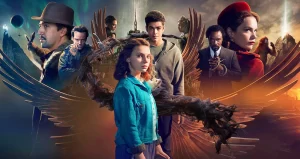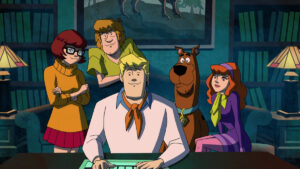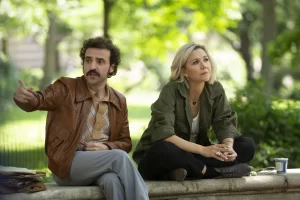I recently completed watching the HBO series His Dark Materials and found myself with mixed emotions. The series is based on the trilogy of the same name by Philip Pullman. The three books, Northern Lights, Subtle Knife, and The Amber Spyglass follow the heroine Lyra through a series of adventures.
Why am I mixed in my opinion of the show? The three season series went from superb to standard action fair to maudlin. When it was great, it was great. When it was not, it was not. Let’s get into the review.
A Season and a Half of Wonder
His Dark Materials starts out wonderfully with playful Lyra and her friend Roger running about with wild recklessness at Logan College where she is something of a ward, having been dropped off by her parents and abandoned.
The story unfolds leisurely but interestingly as we meet the major players. Lyra’s uncle Lord Asriel and the evil Mrs. Coulter who are, of course, her parents. She becomes embroiled in the kidnapping of young children when Roger falls afoul of the villains.
What’s great about this first section of the series is it moves slowly but steadily. We are drawn into the plot and the characters. There are dramatic moments followed by frolic. Comedic relief. Action scenes. Things are mixed up nicely and the story tells itself, no one need explain what is happening and why. I found myself eager for each new episode and not disappointed when it came.
His Dark Materials becomes Action Adventure
The last couple of episodes of the second season suddenly abandoned this approach. It became standard action adventure. Everyone was running around fighting one another. One battle after the next. Lots and lots of running, shouting, and shooting.
All the pacing of the first part of the series vanished in this orgy of violence and drama. It’s almost as if someone told them to spice it up a little. It’s getting boring with all this pacing and interesting character development. Let’s shoot some things, crashes and explosions galore.
The Maudlin End
The death of Scoresby seems to signaled the end of any fun. The entire third season is nothing more than maudlin introspection, heartfelt conversations, and weeping. Lots of weeping.
At least the final season didn’t have as much running around and shooting as the end of the second. Instead, we had one teary-eyed important conversation after the next. We … will … speak … slowly … with … emphasis … on … every … word.
Particularly distressing was Mrs. Coulter’s transition from a frightening villain who brought fear into every room she entered to a weeping and wailing caricature of herself. Every conversation was of the Utmost … Importance and needed teary eyes.
Too Many Explanations
The books are complicated, I understand that. I think the screenwriters needed to remove a lot of complexity, dumb it down a bit. In the end we got tons of exposition but mostly without context. Where did Asriel’s army come from? What were his machines? The specters came from where? Who were the elephant things again? What exactly did Mary do? What was Asriel’s pit weapon thing? Why did worlds have to be closed? Why did the angel die when it killed the priest?
They tried to explain everything and give rationality to it all but it was too much. Too many rules being made up at the last second with little backstory to explain why things needed to happen. Confusing is the word I’d use. Very, very confusing.
The Real Ending
His Dark Materials is really about one thing. It’s the correct interpretation of the fall of man from the Garden of Eden. In Abrahamic religions this is considered a terrible moment. The end of eternal happiness and the beginning of the world’s miseries.
Pullman tells us Eve chose rightfully to escape a horrific cell. She was nothing more than a mindless pet, slavishly worshipping an egomaniacal warden. The escape was our salvation. All we enjoy today, all the good, the wonder, the happiness, and the freedom is a result of their willingness, the human need to escape such a pretty prison.
That’s what His Dark Materials is all about. In the final moments of the last episode, we finally get around to understanding this theme but it’s too late, too late to make it effective for the audience. We needed less time on the complications and more time on the underlying theme. Then it hits home with force.
Conclusion
The books are complex and the series spent the first two seasons in a largely compelling adaptation. Then they thought gunfights, chases, and tear-wrought scenes were what people wanted. It’s a shame they didn’t manage to finish the way they started.
Still, worth a watch.
Tom Liberman








